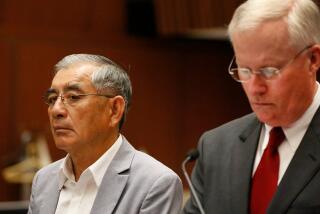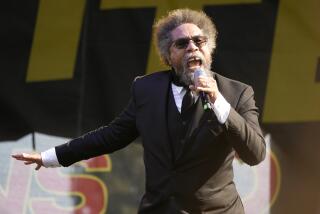4 Indicted in Plot to Siphon Zschau Votes
- Share via
Los Angeles businessman Michael R. Goland, a major contributor to pro-Israel candidates, and three of his associates were indicted by a federal grand jury here Wednesday on felony charges of violating federal election laws by organizing an illegal effort to aid the 1986 reelection campaign of Sen. Alan Cranston (D-Calif.).
According to the indictment, Goland and his associates recruited 55 people to make $120,000 in contributions to a television advertising campaign for American Independent Party candidate Edward B. Vallen with the aim of siphoning votes away from Republican candidate Ed Zschau, thus increasing Cranston’s chances of victory.
The 55 were then reimbursed by Goland and his associates, according to the charges, so that actually they were not the contributors, but Goland was. Such subterfuge is a violation of federal election laws.
Vallen wound up receiving 109,916 votes--about 5,000 more than Cranston’s slim victory margin over Zschau, then a congressman. Vallen’s television commercials, which the indictment charges were prepared under Goland’s direction, portrayed Vallen as a better conservative than Zschau and said that Cranston and Vallen were the only men of integrity in the Senate race.
The five-count indictment accused Goland, 41, Lyle R. Weisman, 31, of Beverly Hills and Sandor E. Habalow, 45, of West Los Angeles of conspiracy, making excessive contributions to a federal candidate, unlawfully making campaign contributions through conduits and causing false statements to be made to the Federal Election Commission.
Another man, Michael B. Altman, 42, of Sherman Oaks, was charged with a single count of aiding and abetting the making of such contributions through the use of conduits or straw contributors.
Shortly after the 1986 election, The Times revealed that many of these contributors were orthodox Jews highly supportive of Cranston and Israel. Their support of Vallen was suspect because he had said he opposed “Zionists.”
If convicted, Goland could face a maximum sentence of 17 years in prison and a fine of $1 million. Defendants Weisman and Habalow could face up to 16 years in prison and fines totaling $875,000, and Altman could face a maximum one year in prison and a fine of $125,000. Arraignment for the four is scheduled for Jan. 3.
Goland’s attorney, Nathan Lewin of Washington, said he had no immediate response to the indictment, as he had not read the formal charges. Altman did not return calls and Weisman and Habalow could not be reached.
Assistant U.S. Atty. Gary Feess and chief FBI investigator William J. Stollhans told a Los Angeles news conference that no evidence had been uncovered that Cranston knew about or authorized the illegal contributions.
In Washington, Cranston’s press secretary, Murray Flander, commented:
“Alan (Cranston) had nothing to do with whatever Goland was trying to do. . . . We were really on the periphery.”
Cranston’s 1986 campaign manager, Barry Sragow, said in a recent interview that Goland had offered his services to the Cranston campaign, but had given his personal assurance that he would not undertake independent efforts similar to the $1.1-million personal campaign he conducted to defeat Sen. Charles Percy (R-Ill.) for reelection in 1984.
Percy was disliked by advocates of pro-Israel positions for taking positions skeptical of Israel while in the Senate.
Sragow said he knew in a vague way of the Vallen ads and “I didn’t want to know the details.” But he said he had no knowledge of any involvement by Goland in funneling the money for the television commercials to Vallen.
Cranston has long been known as a strong supporter of Israel, while Zschau had a more ambivalent position on Middle Eastern issues.
Vallen was a political unknown who had no chance in the race and, before receiving the $120,000 for ads against Zschau, had collected only $5,000 in campaign funds. He said later that he did not know the identity of those contributing to his campaign. He said he had been assured that the contributors were “conservative Christians” and he would not have willingly taken “pro-Israel” money.
Two federal prosecutors and the FBI investigator who spoke at the news conference said they did not believe that Vallen was part of the alleged conspiracy.
Feess, the assistant U.S. attorney, said that the 55 people who allowed their names to be used as contributors and allegedly were reimbursed by Goland were guilty of a technical violation of federal election laws.
But, he said, the U.S. Justice Department has a written policy against prosecuting such “willing conduits,” so these people would not face charges.
The 16-page indictment outlined how Goland and his associates allegedly arranged to set up the illegal contribution scheme.
It said that in June, 1986, five months before the election, Goland hired Colleen Morrow of Washington, who has since been identified as an employee of the International Freedom Foundation, a conservative organization with branches in Israel and South Africa, to come to work for his Balboa Construction Co. to run a $250,000 campaign against Zschau.
Later, in October, the indictment said, Goland and Morrow decided to assist the Cranston campaign and work against Zschau by working to divert Zschau votes to Vallen.
“On Oct. 27, 1986, Goland caused $120,000 to be delivered to Greenstripe Media Inc., for purposes of producing a political advertisement featuring and promoting the (Vallen) candidacy,” the indictment said.
“In order to avoid having to report the advance as a contribution from Goland to the Vallen Campaign Committee to the Federal Election Commission, Goland, Habalow and Weisman then asked various persons . . . to make political contributions to the Vallen campaign with the express understanding that said persons would be reimbursed for their contributions.”
This later was done, the indictment said.
Morrow was not indicted and federal prosecutors would not say Wednesday whether she is now cooperating with them.
Similarly, the prosecutors said there is no evidence at present of any involvement of Israel or Israeli money in the Goland efforts, although they said the investigation is continuing.
Goland attorney Lewin said Wednesday night that he is “quite confident” that the American Israel Public Affairs Committee (AIPAC), which earlier reports had linked to efforts for Cranston and against Zschau, “had no involvement” in the Goland efforts. AIPAC spokesmen have previously denied such involvement.
Zschau, who now heads the Censtor Corp., a San Jose manufacturer of computer discs, said that he is “pleased” with the indictments.
“These after-the-fact prosecutions don’t affect the outcome of the elections,” he said. “But I think it’s important to prosecute fully the election laws. People have to believe that if they violate the laws, they will get more than a small fine. I think that, if the charges are correct, Goland must have been thinking this was a risk worth taking.
“It’s very disappointing for a candidate and a campaign that works so hard so long to win an election to be defeated in a close race and find out later that an illegal tactic has been used,” Zschau said. “I’m not saying the election would have come out differently, but it could have made a difference.”
Federal prosecutor Feess declared:
“The crimes alleged in the indictment strike at the very heart of our governmental process--at the legitimacy and fairness of elections. Left unchecked, such crimes can undermine the public’s confidence in the electoral process.”
Times staff writer Ron Ostrow contributed to this story.
More to Read
Get the L.A. Times Politics newsletter
Deeply reported insights into legislation, politics and policy from Sacramento, Washington and beyond. In your inbox twice per week.
You may occasionally receive promotional content from the Los Angeles Times.










